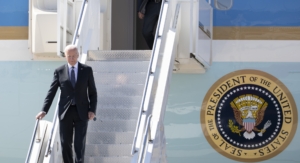NAFTA Talks, Enviro Attacks Go Low, and How Real News Becomes Fake
Here’s What You Need To Know
At a Tuesday rally in Arizona, President Trump said current efforts to renegotiate the North America Free Trade Agreement (NAFTA) are likely to fail, and “we’ll end up probably terminating NAFTA at some point.” The Mexican peso plunged in response to his comments. But, is this really a reflection of the status of negotiations, or is the President just posturing to gain leverage and/or appeal to his political base?
Only a few days before Trump’s comments, representatives from the three NAFTA nations concluded the first round of negotiations, where they outlined their preliminary positions. Here are some of the key issues they discussed that could potentially hold up a deal:
- Made In North America: The Trump Administration is pushing to increase the percentage amount that any finished product must contain of North American materials to qualify as exempt from tariffs under NAFTA. Trump also wants to create a minimum threshold for U.S.-specific materials to help close its trade deficit with Canada and Mexico. This rule is particularly important for the auto industry, where cars must contain at least 62.5 percent American, Canadian, or Mexican materials. While the other Canada and Mexico have expressed a willingness to tighten these rules, both nations voiced strong opposition to creating nation-specific standards.
- Bi-National Courts: During the original NAFTA talks 30 years ago, then-Canadian Prime Minister Brian Mulroney walked away from negotiations until the Americans agreed to include a provision called Chapter 19. This rule created binational panels to settle complaints of trade violations, moving cases out of the domestic court system. The Trump Administration wants to abolish Chapter 19, arguing it infringes on America’s judicial sovereignty. However, Trudeau’s government has so far maintained Canada’s “red line” on this issue. Mexico has been somewhat critical of Chapter 19, but does not support moving these cases into domestic courts. While it may be possible to reach an agreement on updating these bi-national panels, it appears unlikely Mexico and Canada will consent to the U.S. demand to scrap it entirely.
- Dairy Wars: In April, President Trump attacked Canada’s quotas on U.S. dairy as a “disgrace,” arguing these trade restrictions have hurt U.S. farmers. In negotiations, his administration is pushing for the elimination of these quotas. However, Canadian Prime Minister Justin Trudeau has already pushed back against this demand, pointing out that the U.S. has a $400 million dairy surplus with Canada. Since this system of quotas is deeply entrenched in Canada, it seems implausible they will be willing to concede much ground in this area.
Round two of negotiations is scheduled for the first week of September in Mexico City, with five more rounds expected to take place into early 2018. While it remains unclear if these issues can be overcome, political considerations in all three countries may drive their leaders to try to get a deal done sooner rather than later.
Subscribe to Receive Insights
"*" indicates required fields
With Mexico’s presidential election in the spring and the U.S. midterms next fall, both Trump and Nieto may be less willing to make politically risky concessions during their respective campaign seasons. As a result, the next few months will likely be make or break for whether this bid will be successful, and if Trump’s threats are to be taken seriously, whether NAFTA can persist into the future at all.
News You Can Use
WILL THEY CALL IT THE DRAVIS RULE?
Attacks on high-level presidential appointees have long been standard political practice, but environmental groups are taking this practice to the next level, targeting lower-level Trump staffers for doing nothing more than serving in government. The National Resources Defense Council (NRDC) reported on the hiring of an obscure EPA staffer named Samantha Dravis, claiming she was as an “enemy” of her agency, even though she’s merely leading a standard bureaucratic review that was also done by the Obama Administration.
Green groups have already submitted over 100 Freedom of Information Act requests demanding access to her daily schedule and email. The New York Times parroted these attacks, recently publishing a picture of Dravis on their front page and suggesting she was “a vehicle for corporate donors” in her past job without citing any actual evidence. This new threshold of acceptable attacks contributes to the increasingly coarse civic environment and discourages qualified candidates from seeking to serve in government.
FOLLOWING THE MONEY
Throughout every election cycle, campaigns on both sides are placed on the defensive for accepting contributions from controversial or ethically questionable sources. A recent article in Roll Call blames this problem on the difficulty of vetting donors, arguing it’s “an impossible job” because of the sheer number of people who give money to a campaign, the challenge of differentiating between individuals with the same name, and the difficulty of vetting people who are not publicly well-known.
However, this ignores how technological advances can be used to efficiently capture the criminal history, web presence, social media activity, and previous campaign contributions of donors. After this information is collected and organized, it becomes possible to sort out who is who and to identify any issues associated with more obscure people. By devoting the proper resources and expertise to vetting donors, campaigns can put out these fires before they get started.
BRAIN DRAIN U.S.A.
Much of the recent debate on immigration reform has focused on how many visas should be given to highly-skilled immigrants. But what if the U.S. cannot keep the highly-skilled immigrants it already has? Several countries are attempting to lure these workers – especially academic researchers – back from the U.S. Established in 2011, China’s fast growing Thousand Talents program provides generous incentives – like relatively high salaries, free medical care, instant tenure, and eligibility to purchase property at discount rates – for Chinese academics who studied in foreign universities to return home.
This year, Canada introduced a Global Skills Strategy program to process 80% of foreign work permit applications from highly-skilled workers within two weeks, while French President Emmanuel Macron started a campaign designed to attract U.S. climate scientists to France. If these initiatives are successful, other countries may launch efforts targeting critical industries like tech, which could place in jeopardy the competitive advantage of Silicon Valley and the U.S. economy.
TECH INDUSTRY’S HUMAN RIGHTS HYPOCRISY
Major tech companies like Apple, Amazon, and Google, have been espousing politically liberal values at home, while complying with the demands of authoritarian governments abroad. Many of these corporate leaders have issued statements criticizing President Trump’s policies on immigration, transgender individuals in the military, and the Paris Climate agreement, all on the basis of concerns over human rights.
However, the companies they lead have a long history of complying with Chinese government censorship of internet freedom and helping to build the country’s cybersecurity infrastructure that may be used to gather personal information on political dissidents or to steal proprietary trade secrets. These same corporations have also helped crack down on internet freedom in places like Russia and Iran. Balancing business objectives with reputational goals is difficult for any multi-national corporations, but disconnects between domestic policy rhetoric and corporate practices abroad can undermine companies’ credibility in such “values” discussions.
A MEDICARE TOURISM WIN-WIN?
AEI Scholar Andrew Biggs is promoting a plan he claims can help tackle two seemingly unrelated policy challenges at once: rising Medicare costs and Puerto Rico’s financial troubles. Biggs suggests compensating Medicare patients who travel to Puerto Rico for significantly cheaper care half the difference between the cost of a procedure on the mainland and on the island. He argues this idea would not only save the government money by encouraging Medicare enrollees to seek out cheaper procedures, but also boost the Puerto Rican economy by increasing medical tourism.
As an ancillary benefit, the proposal could also help address Puerto Rico’s current doctor shortage by creating more jobs for these and other health care workers. As more controversial health care reforms fail to gain traction even as healthcare costs keep rising, look for more of these types of proposals to emerge seeking non-partisan “win-win” opportunities.
HOW REAL NEWS BECOMES FAKE
Lost in the debate over the proliferation of fake news stories is how changes in the presentation of real news are altering the public’s perception of reality. According to writer Tobias Rose Stockwell, the rise of news consumption through social media has increased the incentive of media outlets to write sensationalized headlines to attract clicks and advertising revenue.
However, since many users only read headlines, this limited picture often becomes the de facto perception of the real story. Add in algorithms that target these headlines at users based on their existing biases and fears, and the result is a formula for the rapid spread of half-truths. As a result, having the facts on hand and understanding how individuals and groups are using social media networks to spread misinformation is critical to push back against false narratives.



